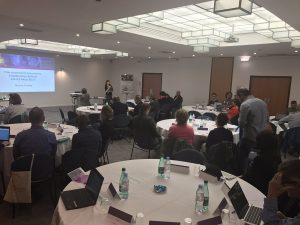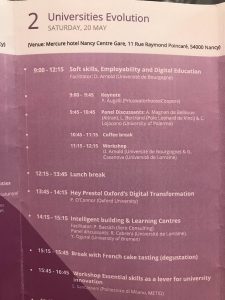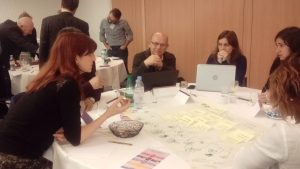Daily chronicle – 2nd day of the Leadership School
By Julie Bu Daher & Laura Infante Blanco
Anne welcomed all present participants as well as the newcomers for the second day of the leadership school and launched the first session of the day. The first session started with a keynote presented by Primiano Augelli from PWC. He highlighted the corporate view of the importance of acquiring new skills and then presented the way his firm is dealing with competence and skill development. In the current context, where changes are so rapid, the stake for the transformation is high. He explained that it is very difficult to do predictions as the future is not what it used to be. He confirmed that also smart guys make wrong predictions by providing the example that in the early 80s they predicted that there would be less than 1 million cell phones by 2000.
Deborah Arnold then started the discussion panel and gave the floor to Laura Bertrand from Pole Leonard De Vinci. She presented a brief description of Group Leonard de Vinci. It is a business school, engineering school and school of web design and multimedia. They have a big digital focus, their DNA is transversality and hybridation. In November 2015, they created a department of soft skills to meet the expectations of the companies and handle the revolution that students will face in the future in a more digitized world, and to develop soft skills. Average student satisfaction rate of soft skills is 80 %. They also have strong positive feedback from partners and parents and positive media interest and coverage.
The following talk was presented by Carla Lojacono from University of Palermo in the domain of soft skills for students. She claimed that there is a skill shortage and lack of connection between student soft skills and those required by employers. She confirmed that these skills affect the salary. She highlighted the differences between the point of view of the educational sector that believes that students have skills and the employer sector that believe that students lack these skills.
Keywords: digital revolution, soft skills, digital soft skills.
After the Lunch break P.O’Connor made an introduction to the main points and difficulties they are finding to carry out the digital transformation at Oxford University. The stake of the transformation is high since they have to balance between the value of traditional forms of teaching and the performance of modern forms of learning/teaching. To solve the problem, they decided to implement a series of measures involving communication, setting priorities, providing the tools and the help, and capitalising on passion for teaching. In their strategy, they also made a big effort to implement programs for student pacing, bridging the gap between school and university, and including open education and tutorials.
And then it was the time to talk about learning physical spaces. P. Bacsish facilitated the following session about Intelligent building and learning centres.
The first speaker of this round was Rafael Cabrera (University of Lorraine), with a presentation entitled : new spaces, new interactions at university for the digital era. He talked about an approach for evolution of learning and living spaces which seeks for the synergy between strategies and initiatives and between practices and places. The enormous complexity of the task lies in the large size of the university in number of people involved and the distances between the centres. The solution requires some guiding values like: impacting as many places as possible, widespreading practices and innovative spaces, and giving time for reflection. He finished its presentation with many examples of successful reorganisation of learning spaces
Then, It was the turn for Yildiray Ogurol from University of Bremen to talk about the transformation process in his institution which provides many services for e-learning including: LMS, one of the largest e-assessment in Germany, and a media service which supplies infrastructure for lectures production. The different buildings have been provided with multimedia learning rooms for students, which can be booked through the LMS, whose main objective is to facilitate the collaborative learning. The latter rooms, fully equipped with screens, computers, whiteboards and mediaboxes, were object of an evaluation study with a very positive feedback from students.
A delicious french cake tasting, with the traditional “macarons” among others marked the end of the Intelligent building and learning centres session.
Keywords: learning spaces, living spaces, e-assessment, digital libraries, LMS
Immediately after the break, a workshop about essential skills as a lever for university innovation took place, and the assistants were invited to play the role of decision makers in order to define a strategy to carry out the digital transformation of their HE institutions.
The third session of the meeting was facilited by Angela Procoli (FMSH) and Denes Zarka (Budapest University of Technology and Economics).
Stylianos Hazipanagos (kings college) opened the session with a presentation entitled from ‘distance’ to ‘digital’ to ‘open’: the changing landscape of higher education and implications for strategy and leadership. The talk consisted in a very detailed review of the multiple points which can be included in a strategic plan to support technology (TEL stragegy) through the learning process in a HE institution, along with the pros and cons and the difficulties which can be encountered during the implementation. For instance, the usefulness of a good LA to investigate and visualise large institutional data sets in the service of improving learning; the importance of evaluation plans, making use of measures, standards of quality, benchmarking, rubrics, etc. when implementing online lectures; taking into account all dimensions of ODL when deciding about autonomous models or collaborative ones (like consortia); take a close look at the existing TEL strategy, practices and technology, when designing a MOOC.
Tian Belawati (Rector of Universitas Terbuka) carried on with the session’s subject showing the example of the Open University of Indonesia. She demonstrated to us that a complete digital educative open university is not only possible, but the best way to widen access altogether with good quality learning standards and high success rates among the students. The context of this institution is very particular, as Indonesia is a country with a very low level of HE and also of internet penetration (around 50% for the latest). Since 1995, this dynamic institution has been continuously evolving to provide a growing number of distant technological learning services such as online tutorials, online self test exercises, an internet TV, an office 365 for students, and many others. More than one thousand learning resources are at students’ service and face to face materials are available on demand. Lately they tried to solve the problem of the low internet availability by offering a free internet access to students and they are currently implementing an online tutors program.
Finally, Mark Brown told us about The example of Dublin City University, Ireland in a presentation plenty of explanatory audiovisual guides. Again this time, the context is very particular, as this institution consider itself as an “age friendly university”. The concept of this entity, which is part of the Early Adopters of Online Instruction, is based in the following principles: 1) continuously improve to go beyond online learning, 2) reframing their LMS/VLS system (called Loop) and 3) walking the talk with initiatives like DCU fuse. M. Brown ended his presentation and this intensive working day with three final useful remarks/tips: “the function of leadership is to produce more leaders and not more followers”, “culture eats strategy for lunch” and “digital transformation should be in the service of big ideas and not big ideas itselves”
Keywords: ODL, TEL strategy, evaluation, measures, benchmarking, rubrics, online learning services, LMS, MOOC’s
Tips of the day:
- It is very important to develop soft skills to meet the expectations of the companies and handle the revolution that students will face in the future in a more digitized worl
- Predicting the future in an evolutionary world has become a difficult and critical task
- In order to achieve optimal learning we need optimal equipments in optimal environments
- The digital transformation is a big challenge that can generate uncertainty and a certain degree of distrust, but communication is the best tool to deal with the problem
- The future is not something we enter but something we create!
‹ Daily chronicle – first day of the Leadership School Daily chronicle – 3rd day of the Leadership School ›




Comments are currently closed.